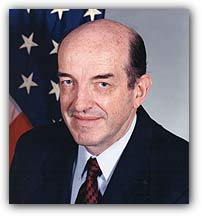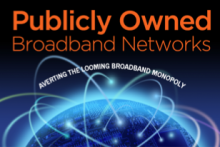
Fast, affordable Internet access for all.

“Our communities cannot afford higher prices and less choices. We need the FCC and DOJ to block this takeover if it's found to be in violation of antitrust law and does not meet public interest obligations,” said Betty Yu, National Organizer for MAG-Net. "If AT&T takes over T-Mobile, it will be a disaster for all mobile phone users. It will stifle information, choice and innovation- and lead to higher prices and fewer jobs nationwide, added CMJ's Policy Director, amalia deloney. "It's a real jobs and democracy killer.” The groups also contend the takeover will disproportionately harm consumers of color, who rely on their cell phones to access the Internet more than whites. While 10 percent of whites access the Internet only from their phones, 18 percent of blacks and 16 percent of English-speaking Latinos depend on affordable wireless coverage to get online.And an excerpt from the letter [pdf]:
The impact that this merger would have on affordable mobile phone service, broadband access and adoption, openness on the mobile web and broadband competition presents a real threat to our communities. We hope that the Department of Justice and Federal Communications Commission will examine AT&T's proposed acquisition of T-Mobile with appropriate scrutiny and protect our communities by blocking this merger. We intend to host a series of open and participatory meetings in our communities to discuss this merger, and we hope that FCC Commissioners will commit to joining us. It is only by communicating directly with people and hearing our stories that you will feel our deep concerns with this merger and the devastating impact it would have on our communities.We continue to advocate for universal, affordable, fast, and reliable broadband, which to us means a wired connection eventually to all homes that are connected to the electrical grid.
According to the City, Comcast's 2011 Basic Service Rate change went from $13.30 to $15.80 a month. This came in the wake of previous rate hikes—to $9.05 in 2008, to $10.30 in 2009, and to $13.30 in 2010. That all adds up to "more than 60%, on a service that is supposed to be affordable and is identified in the industry as ‘lifeline service'," Boston says. "In addition, when comparing Boston to neighboring communities that have rate regulation, Comcast has over-collected approximately $24 million from Boston's Basic Subscribers during the four year period from 2008 through 2011," the City's statement claims. Its own research indicates that neighboring cities that are still regulated, such as Cambridge, have cheaper rates.This has led the Boston Globe to editorialize "If cable firms act as monopolies, cities should be able to regulate.
When the Federal Communications Commission took away Boston’s power to regulate basic cable rates almost a decade ago, the assumption was that competition for pay-TV services would hold prices down for consumers. That assumption has not panned out. Comcast Corp., the successor to Boston’s original cable franchisee, still dominates — not least because its former monopoly status conveys lingering advantages that hamper competition even now.
The Rural Broadband Policy Group is a growing national coalition of rural broadband advocates that emerged from the National Rural Assembly. The group's goals areWe adopted the following principles:
- to articulate national broadband policies that provide opportunities for rural communities to participate fully in the nation's democracy, economy, culture, and society, and
- to spark national collaboration among rural broadband advocates.
Big telecommunications companies have failed in extending Internet service to rural areas. They claim it is costly and not profitable. We are tired of waiting for AT&T, Verizon, and Comcast.
Getting broadband out to all our citizens is not just something that would be nice for us to do. It is something essential for us to do if we want to provide individuals the opportunity to live productive and fulfilling lives in the Twenty-first century and something equally imperative if we want our country to have a competitive edge in this challenging world.But he moved on to highlight the importance of communities having the right to build their own networks, should they deem it necessary:
When incumbent providers cannot serve the broadband needs of some localities, local governments should be allowed--no, encouraged--to step up to the plate and ensure that their citizens are not left on the wrong side of the great divide. So it is regrettable that some states are considering, and even passing, legislation that could hinder local solutions to bring the benefits of broadband to their communities. It's exactly the wrong way to go. In this context, too, our previous infrastructure challenges must be the guide. The successful history of rural electrification, as one example, is due in no small part to municipal electric cooperatives that lit up corners of this country where investor-owned utilities had little incentive to go. Those coops turned on the lights for a lot of people! You know, our country would be a lot better off if we would learn from our past rather than try to defy or deny it.
 We strongly support his comments, while emphasizing that an incumbent that simply provides DSL or cable services must not be construed as necessarily serving the broadband needs of communities.
We strongly support his comments, while emphasizing that an incumbent that simply provides DSL or cable services must not be construed as necessarily serving the broadband needs of communities.Medin also advocated for a policy loathed by some parts of the cable industry: municipal broadband. "Localities know more about what works for their communities than state governments or the federal government do. In the end, we feel that while this is probably not the right choice in many cases, it is something that should not be prohibited," he said. Allowing communities to address their own broadband needs could help extend broadband to rural areas, according to Medin.We have been offering in-depth coverage of Time Warner Cable's efforts to strip communities of that authority in North Carolina as well as other issues around preemption. Medin's statement echoes that of the FCC National Broadband Plan: "Congress should make clear that Tribal, state, regional and local governments can build broadband networks." This recommendation was recently Reiterated by FCC Commissioner Mignon Clyburn:
I recently learned that several state legislatures are considering bills that are contrary to the deployment objectives of the Broadband Plan. For example, in North Carolina, the state legislature is currently evaluating legislation entitled ‘Level Playing Field/Local Government Competition.’ Last week the North Carolina House passed the bill, and it currently awaits consideration in the Senate. This piece of legislation certainly sounds goal-worthy, an innocuous proposition, but do not let the title fool you.
Several days at the National Conference for Media Reform in Boston gave me time to reflect on the importance of protecting local authority to build, own, and operate their own networks connecting people and businesses to the Internet. Multiple presentations focused on the importance of and strategies for ensuring access to the Internet is not controlled by a few companies -- and most of these strategies are focused at federal government agencies and Congress.
While we support these efforts, the Institute for Local Self-Reliance is not a DC-centric organization. We try to help folks in DC learn about what is happening outside the beltway, but our passion and work focuses directly on helping local communities invest in themselves and preserve their self-determination.
Access to the Internet will likely be the key infrastructure investment that determines how well communities fare in the coming years. Unfortunately, they have very little control over how those investments are made when the networks are owned by private, absentee companies. Efforts like Universal Service Fund reform, fixing the FCC, re-writing the telecom act, and ensuring network neutrality depend on overcoming incredibly powerful (due to their scale and lobbying power) interests in Washington, DC. But local communities have very little power outside their borders... with some in state capitals and practically none in the nation's capital.
STATEMENT BY FCC COMMISSIONER MIGNON L. CLYBURN ON PROPOSED ANTI-MUNICIPAL BROADBAND LEGISLATION I have serious concerns that as the Federal Communications Commission continues to address broadband deployment barriers outlined in the National Broadband Plan, new obstacles are being erected that are directly contrary to the Plan’s recommendations and goals. I recently learned that several state legislatures are considering bills that are contrary to the deployment objectives of the Broadband Plan. For example, in North Carolina, the state legislature is currently evaluating legislation entitled ‘Level Playing Field/Local Government Competition.’ Last week the North Carolina House passed the bill, and it currently awaits consideration in the Senate. This piece of legislation certainly sounds goal-worthy, an innocuous proposition, but do not let the title fool you. This measure, if enacted, will not only fail to level the playing field; it will discourage municipal governments from addressing deployment in communities where the private sector has failed to meet broadband service needs. In other words, it will be a significant barrier to broadband deployment and may impede local efforts to promote economic development. The National Broadband Plan recommended that Congress clarify that State, regional, and local governments should not be restricted from building their own broadband networks. When providers cannot meet the needs of local communities, the Plan provides that State, regional, and local entities should be able to respond accordingly, as they were able to do when municipal governments distributed electricity to thousands of rural communities during the 20th Century.

The Institute for Local Self-Reliance is pleased to release the Community Broadband Map and report, Publicly Owned Broadband Networks: Averting the Looming Broadband Monopoly. The map plots the 54 cities, big and small, that own citywide fiber networks and another 79 own citywide cable networks. Over 3 million people have access to telecommunications networks whose objective is to maximize value to the community in which they are located rather than to distant stockholders and corporate executives.
ILSR has been tracking telecommunications developments at the local and state level, working with citizens and businesses to preserve their self-determination in the digital age.
View the Community Broadband Map
Download the Report [pdf]
Read the Press Release [pdf]
Quietly, virtually unreported on, a new player has emerged in the United States telecommunications sector: publicly owned networks. Today over 54 cities, big and small, own citywide fiber networks while another 79 own citywide cable networks. Over 3 million people have access to telecommunications networks whose objective is to maximize value to the community in which they are located rather than to distant stockholders and corporate executives.
Even as we grow ever more dependent on the Internet for an expanding part of our lives, our choices for gaining access at a reasonable price, for both consumers and producers, are dwindling. Tragically, the Federal Communications Commission has all but abdicated its role in protecting open and competitive access to the Internet.
Now more than ever we need to know about the potential of public ownership. To serve that need the Institute for Local Self-Reliance has published an interactive Community Broadband Map that gives the location and basic information for existing city owned cable and fiber networks.